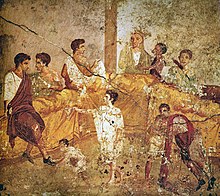 Global Information
Global InformationRoman people information
Latin: Rōmānī Ancient Greek: Ῥωμαῖοι, Rhōmaîoi[a] | |
|---|---|
 1st century AD wall painting from Pompeii depicting a multigenerational banquet | |
| Languages | |
| |
| Religion | |
| |
| Related ethnic groups | |
| Ancient Italic peoples, ancient Mediterranean peoples, modern Romance peoples and modern Greeks |
The Roman people (Latin: Rōmānī; Ancient Greek: Ῥωμαῖοι, romanized: Rhōmaîoi; Greek: Ρωμαίος, romanized: Romaíos)[a] was the body of Roman citizens during the Roman Kingdom, Roman Republic and Roman Empire. Variously referred to as a cultural group, a nationality or a multi-ethnicity,[2][3][b][4][5] the meaning of "Romans" underwent considerable changes throughout the long history of Roman civilisation as its borders expanded and contracted. In classical antiquity, from the 2nd century BC to the 5th century AD, the Romans ruled large parts of Europe, the Near East and North Africa through conquests made during the Roman Republic and the later Roman Empire. Originally only referring to the Italic Latin citizens of Rome itself, by late antiquity Roman identity evolved into a collective geopolitical identity, extended to nearly all subjects of the Roman emperors and encompassing vast regional and ethnic diversity.[6]
Citizenship grants, demographic growth, and settler and military colonies rapidly increased the number of Roman citizens. The increase achieved its peak with Emperor Caracalla's AD 212 Antonine Constitution, which extended citizenship rights to all free inhabitants of the empire. Roman identity provided a larger sense of common identity and became important when distinguishing from non-Romans, such as barbarian settlers and invaders.[7][8] Roman culture was far from homogeneous; though there was a common cultural idiom, one of the strengths of the Roman Empire was also its ability to incorporate traditions from other cultures, notably but not exclusively Greece.

The collapse of the Western Roman Empire in the 5th century ended the political domination of the Roman Empire in Western Europe, but Roman identity survived in the west as an important political resource. Through the failures of the surviving Eastern Roman Empire, also called the Byzantine Empire, of reconquering and keeping control of the west and suppression from the new Germanic kingdoms, Roman identity faded away in the west, more or less disappearing in the 8th and 9th centuries. In the Greek-speaking east, still under imperial control, Roman identity survived until the fall of the Byzantine Empire in 1453 and beyond.
Whereas Roman identity faded away in most of the lands where it was once prominent, for some regions and peoples it proved considerably more tenacious. In Italy, "Romans" (Romani in Latin and Italian) has continuously and uninterruptedly been the demonym of the citizens of Rome from the foundation of the city to the present-day. During the Eastern Roman Empire and for some time after its fall, Greeks identified as Romioi, or related names. In Switzerland several names are Roman references: the Romands and the Romansh people. Several names derive from the Latin Romani (such as the Romanians, Aromanians and Istro-Romanians), or from the Germanic walhaz (a term originally referring to the Romans; adopted in the form Vlach as the self-designation of the Megleno-Romanians).[9]
- ^ Rochette 2012, p. 553.
- ^ Gruen 2014, p. 426.
- ^ a b Diemen 2021, p. 47.
- ^ Darling Buck 1916, p. 51.
- ^ Faniko & Karamuço 2015, p. 3.
- ^ Stouraitis 2018, p. 127.
- ^ Hope 1997, p. 118.
- ^ Milavec 2020, pp. 91–92.
- ^ Pohl 2014, p. 417.
Cite error: There are <ref group=lower-alpha> tags or {{efn}} templates on this page, but the references will not show without a {{reflist|group=lower-alpha}} template or {{notelist}} template (see the help page).